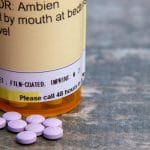Lunesta (the brand name for eszopiclone) is a nonbenzodiazepine sedative-hypnotic sleep aid and is classified as a Schedule IV controlled substance.
This prescription drug treats sleep disorders like chronic insomnia. It helps many people fall asleep faster or wake up fewer times each night and is often compared to other sleep aids like Ambien (zolpidem) and Sonata (zaleplon).
However, despite these medical uses, Lunesta can also be addictive.
According to the Food and Drug Administration (FDA) and the Drug Enforcement Administration (DEA), Lunesta has a low potential for abuse. However, both agencies warn that Lunesta can still lead to dependence and addiction.
Lunesta Drug Class
Lunesta belongs to the nonbenzodiazepine sedative-hypnotic drug class. It’s also considered a central nervous system (CNS) depressant.
It works by binding to the GABA receptors in the brain and CNS to slow down brain activity. This produces a calming effect and can make falling asleep easier, which is why it’s prescribed for the treatment of insomnia.
When abused, sleeping pills like Lunesta can produce a high or euphoric feeling. This feeling can easily lead to long-term abuse.
The more you abuse the drug, the more likely you are to build up a tolerance to it and feel the need to take higher and higher doses of Lunesta to obtain the same effect you once felt. This can then lead to dependence and addiction.
Is Lunesta A Narcotic?
Because Lunesta doesn’t contain any opioids or opiates, and is a legal prescription medication, it is not considered a narcotic. But like prescription opioids, Lunesta is a controlled substance.
Lunesta Drug Schedule
The DEA classifies Lunesta as a Schedule IV controlled substance. This means that it has a low potential for abuse compared to other more potent drugs, but it can still lead to dependence and addiction.
Because of its potential for addiction, the government keeps tight control over who prescribes it and how much is given.
Side Effects Of Lunesta Abuse
If you abuse Lunesta, you may experience side effects. These side effects can range from mild to severe depending on the dose you take.
The most common side effects may include:
- drowsiness
- dizziness
- headache
- lightheadedness
- unpleasant taste in mouth
- loss of coordination
- next day sleepiness
- dry mouth
- indigestion
- nausea and vomiting
- anxiety
- hallucinations
- sleepwalking, sleep-driving, and other activities while asleep
- depression/worsening of depression
Serious Side Effects
Beyond the common side effects, Lunesta can also lead to serious side effects. While these are rare, if you’re abusing the drug, it’s important to know what possible adverse effects could occur.
The serious side effects you may experience while on Lunesta can include:
- hives
- rash
- itching
- swelling of the eyes, face, lips, tongue, throat, hands, feet, ankles, or lower legs
- difficulty breathing or swallowing
- feeling that the throat is closing
- hoarseness
Many of these serious side effects occur due to an allergic reaction to Lunesta. If you are allergic to any of the ingredients in Lunesta, it’s best to stay away from it.
Lunesta Withdrawal Symptoms
Withdrawal symptoms may appear once you’ve built up a dependence on the drug and then try to stop taking it.
The severity of withdrawal symptoms depend on a number of factors including how long you used Lunesta, how frequently it was used, what the dose was, if it was mixed with other drugs, and your medical history.
Lunesta withdrawal symptoms may include:
- anxiety and panic attacks
- irritability
- abnormal dreams
- rebound insomnia
- muscle spasms
- tremors
- excessive sweating
- nausea and vomiting
- fatigue
- short-term memory loss
- poor concentration
- depression-like symptoms
Lunesta Addiction Treatment
There are many types of treatment for anyone dealing with Lunesta abuse, dependence, and/or addiction.
Treatment options may be offered on an inpatient or outpatient basis and may include:
- medical detox support in a healthcare setting
- behavioral therapy
- group therapy
- peer support groups
- mental health counseling
For information on our outpatient rehab programs, please contact us today.
Sources
Written by
Northeast Addition Editorial Team
©2024 Northeast Addition Center | All Rights Reserved
This page does not provide medical advice.




